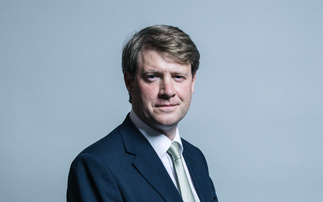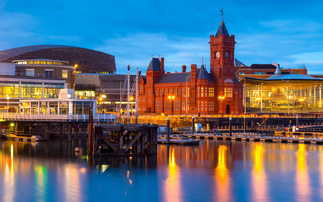ECIU's Richard Black argues the Chancellor's domestic climate policy is increasingly out of step with a post-Paris world
The United Nations climate change summit that ended just 17 days ago in Paris has spawned two distinct, diametrically opposed narratives regarding the deal itself and its implications for the UK.
One holds that the Paris deal means nothing. Fossil fuel use will continue to soar ('more than 2,500 coal-fired power stations' are being built around the world, Nigel Lawson told the House of Lords recently, ignoring both the difference between ‘planning' and ‘building' and the real-world evidence showing that only a fraction of planned stations get built), and developing countries will not reduce their greenhouse gas emissions (despite clearly-enunciated pledges from China and others to do so).
The logical conclusion is that the UK is still the only country cutting carbon emissions, its industry is thereby being destroyed, and therefore the Climate Change Act should be demolished. (You can copy and paste the same argument into a US newspaper article, substituting the US for the UK as the only country doing anything and the Clean Power Act for the CCA as the beast to be repealed, if you wish.)
The opposite narrative holds that the Paris deal means everything. All governments are inextricably pledged to ending fossil fuel use around 2050, investments are already switching by the bankload into wind and solar power, and collective carbon-cutting ambition will be ramped up to unprecedented levels the next time that Presidents and Prime Ministers get together.
Clearly more than nothing
The truth, of course, lies somewhere in between.
Even the most ardent Paris cheerleaders cannot ignore the fact, for example, that Poland has a new government intent on undermining the EU's 2030 climate and energy package, or that victory in the next Presidential elections for any Republican candidate from Donald Trump to Jeb Bush could presage a U-turn in national policy faster than you can say ‘zero-carbon homes'.
Nevertheless, it takes a very special pair of blinkers to be able to maintain, straight-faced, that Paris and the months leading up to it have changed nothing. Every government agreed the deal voluntarily. Virtually all of them, covering more than 99 per cent of global carbon emissions, put forward emission-cutting pledges, again voluntarily.
What kind of bizarrely tortured mental construction does it need to claim that all of this is sophistry? When even Saudi Arabia agrees to a declaration that unabated fossil fuel use will come to an end this century, the Paris agreement is clearly a lot more than nothing.
The next few months, then, should produce some interesting conversations within the UK government, particularly in the Treasury rooms, where a unilateral guillotine has decapitated most elements of UK energy policy over the last six months.
Building capacity?
Even without the Paris agreement, the UK's changed direction since May was raising eyebrows, including in Conservative circles. To be a self-proclaimed ‘climate leader' and then be the only member of the G7 to increase fossil fuel subsidies? To publicly endorse carbon budgets while simultaneously admitting that post-cull, policies are not stringent enough to meet them? To slash support for energy efficiency, renewables and carbon capture on cost grounds while supporting the ever more expensive Hinkley nuclear project until after mid-century?
As a Sunday Telegraph headline would never say: ‘#WTF???'
These are not criticisms uniquely rooted in green concerns, but more widely in questions of credibility and competence. Energy policy used to be aimed fairly and squarely at meeting all three elements of the ‘trilemma' - but currently, it shows little sign of meeting any.
For example, gas apparently now lies closest to the government's heart. So on security of supply, where are the policies that will lead to new gas-fired power stations being built? Nowhere, if results of the last Capacity Market auction are anything to go by. On decarbonisation, where are the policy measures needed to accelerate emission reductions across the wider economy to compensate for the higher power sector emissions caused by building gas-fired power stations rather than truly low-carbon generation? Again, nowhere. And on cost, where can investors find the guarantees of policy stability that will lead to cheap borrowing? Again... you've guessed it.
The word ‘omishambles' has been affixed once before to Mr Osborne's lapel during his time as Chancellor. Unless Treasury backs new policy measures to replace the ones hacked away by his advisors and mandarins, which can put Britain's energy system back on track to meeting all elements of the trilemma, one senses a real possibility that it will re-attach itself in connection with energy policy - or rather, the lack thereof.
Stranded arguments?
The Paris outcome bears materially on the Treasury now, for two reasons.
Firstly, the global direction of travel towards a low-carbon economy is now clear, even if the precise rate is not. That accentuates arguments about stranded assets, affordable renewables, business opportunities and so on. Swimming against the tide is sometimes justified; but the stronger the tide, the stronger the reasoning has to be. Basing energy policies on the zeitgeist around the Spectator lunch table looks increasingly untenable.
Secondly, the huge and diverse set of organisations that argued for a strong Paris deal are not going to sit idly by and let Treasury plough its own furrow. As a quick aide-memoire, they include all major religions, the CBI, doctors and the military, in addition to the more familiar coalitions of scientists, environmentalists and development groups - not forgetting some eminent Conservative Peers and MPs.
They all know that the euphoria they felt when M Fabius brought down his gavel means nothing unless governments follow through; and governments who claimed to lead the High Ambition Coalition, as did the UK, have now set expectations that those same advocates will demand are met. Ministers who fail to deliver, whether in the UK or elsewhere, can expect a very bumpy ride in the cart of public opinion.
Journalists, now, will also be looking at government policies with a new eye. Journalists come in all shades of background and political hue, but what unites all is an unerring nose for hypocrisy. A government that pursues high ambition in Paris and high carbon domestically will invite increasingly unflattering coverage, even from previously compliant outlets.
Mr Osborne spent much of his speech at the Conservative Party Conference telling delegates that ‘we are the builders'. Following Paris, the question that many will be addressing to him in 2016 is: ‘So what exactly, Chancellor, are you building?'
Richard Black is director at the Energy and Climate Intelligence Unit
This article is part of BusinessGreen's Road to Paris hub, hosted in association with PwC.







